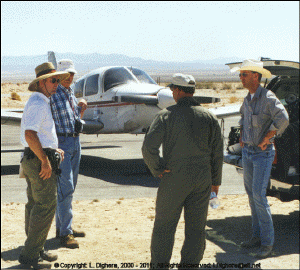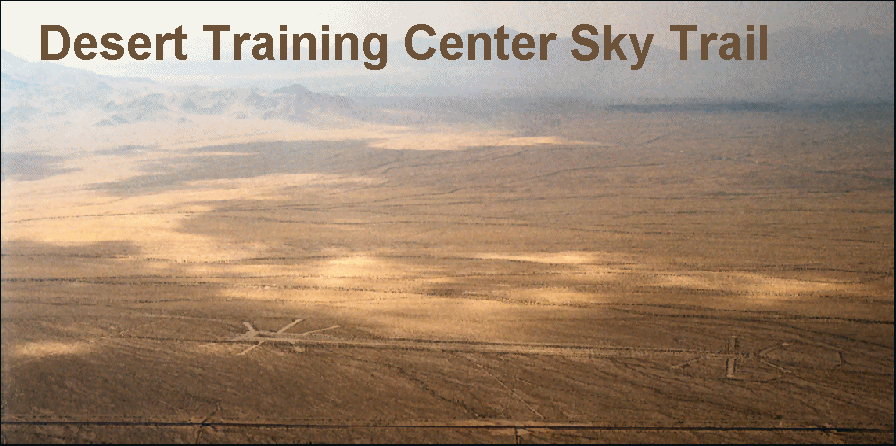
Desert Training Center information

|
| Rolla Queen, BLM Archeologist |
 |
| Iron
Mountain, 2000: BLM archeologist Rolla Queen and state historian Matt Bischoff discuss photo-shoot with helicopter pilot
|
The U.S. Department of Interior Bureau of Land Management (BLM)
now oversees the lands on
which
former Desert Training Center/C-AMA lie. The agency is engaged in an
effort to protect and interpret these sites for the public.
The BLM has made a dedicated effort in preserving the remaining features at these historically significant sites through protection and interpretation for the benefit of future generations. Much more was here, but thoughtless visitors have stolen the remains which were easy to carry. When you visit these or other historic sites in the desert, please leave all historic objects as you found them, so they can be enjoyed by those who follow you. These sites and artifacts are protected by Federal and State law, with substantial penalties for violators.
Tank tracks still mark much of the landscape, and remnants from many of the 12 fields camps remain, mostly rock mosaics, altars, airfields, and road alignments. The Bureau of Land Management, which now owns much of the former DTC's land, is currently trying to raise funds to preserve these camps, and monuments and protective fences are slowly appearing in these areas. A substantial portion of the DTC is still occupied by the military, in a network of ranges all across the Mojave, at places such as the Yuma Proving Grounds and the Chocolate Mountain Bombing Range.
The discharge or use of firearms and the use of metal detectors at all Patton Camps is prohibited
BUREAU OF LAND MANAGEMENT PURPOSE
Like other land managing agencies, the BLM receives direction for the management of public lands under their jurisdiction from several sources. In the case of the Mojave Desert, the specific purpose of wilderness areas administered by the BLM is provided in Sec. 2(b)(1) of the CDPA. These areas must be managed in accordance with these purposes and the Wilderness Act.
Non-wilderness public lands in the Mojave Desert are administered by the BLM in accordance with the Federal Land Policy and Management Act of 1976 (FLPMA) and the BLM Mission Statement.
Sec. 103(c) of FLPMA provides the following direction:
Provide for a combination of uses that best meets present and future needs of the American people
Sustain in perpetuity renewable resources
The BLM Vision Statement also provides specific management direction:
Provide for a wide variety of public land uses without compromising the long-term health and diversity of the land and without sacrificing significant natural, cultural and historical values.
California State Parks
Matt Bischoff, California State Historian III
Mr. Bischoff has worked as a historian, architectural historian, and
historical archaeologist all over the west including in Nevada,
 Arizona,
New Mexico, Utah, and all parts of California. His professional
interests include military history, historic architecture, mining,
transportation, Native American history, among others. Mr. Bischoff is
also author of
The Desert Training Center/California-Arizona Maneuver
Area,1942-1944 HISTORICAL AND ARCHAEOLOGICAL CONTEXTS; Matt C. Bischoff
and other DTC related documents.
Arizona,
New Mexico, Utah, and all parts of California. His professional
interests include military history, historic architecture, mining,
transportation, Native American history, among others. Mr. Bischoff is
also author of
The Desert Training Center/California-Arizona Maneuver
Area,1942-1944 HISTORICAL AND ARCHAEOLOGICAL CONTEXTS; Matt C. Bischoff
and other DTC related documents.
Date of last edit: August 28, 2011 04:27:43 -0700
